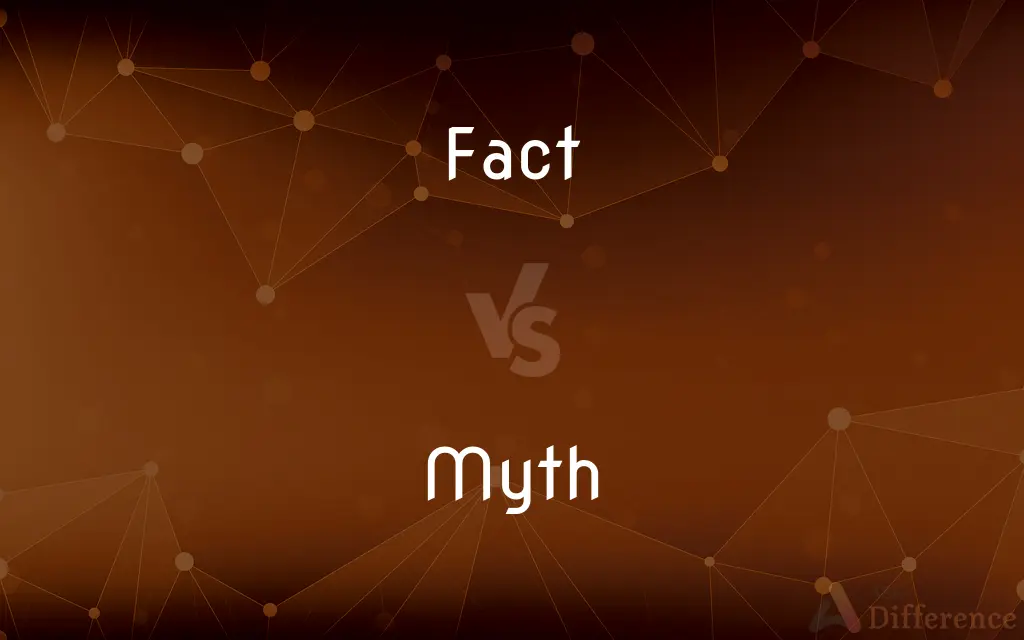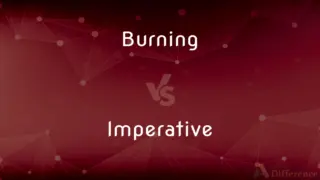Fact vs. Myth — What's the Difference?
By Tayyaba Rehman — Updated on September 28, 2023
Fact is a statement that can be proven to be true or existent; a myth is a traditional story, typically involving supernatural beings or events, which explains some natural or social phenomenon.

Difference Between Fact and Myth
Table of Contents
ADVERTISEMENT
Key Differences
Fact and Myth delineate contrasting realms of human understanding, representing objective truth and traditional storytelling, respectively. A fact is a piece of information that is indisputable and can be validated through empirical evidence or logical reasoning. Facts are the bedrocks of rational discourse and scientific inquiry, serving as the basis upon which knowledge is built. They are quantifiable, observable, and are subject to verification, offering clarity and precision in the representation of reality.
Conversely, a myth is a traditional story or narrative, often rooted in a particular culture or civilization, explaining some natural or social phenomenon, typically involving supernatural beings or events. Myths are vehicles of cultural expression and societal values, illustrating the ways in which different cultures perceive and interpret the world around them. Myths may not necessarily be factual, but they encapsulate the wisdom, beliefs, and experiences of a society, providing insight into its history, morals, and cosmology.
The distinction between fact and myth is vital in discerning objective truth from cultural narratives. While facts are universally accepted truths, validated through empirical means, myths are culturally contextual narratives that offer symbolic explanations for the mysteries of the universe. Facts endeavor to accurately depict the world, whereas myths provide metaphorical interpretations, reflecting the collective psyche and ethos of a civilization.
These contrasting concepts coexist and intertwine in human cognition and culture, shaping our understanding of the world. Facts ground us in reality, offering tangible and objective knowledge, while myths enrich our cultural and spiritual lives, painting our existence with the colors of imagination and symbolism. Recognizing the interplay between fact and myth is crucial for a nuanced understanding of the human experience.
Comparison Chart
Definition
A statement proven to be true or existent
A traditional story explaining natural or social phenomena
ADVERTISEMENT
Basis
Empirical evidence or logical reasoning
Cultural beliefs, values, and imagination
Purpose
To provide objective and verifiable information
To convey cultural wisdom, morals, and explanations
Nature
Quantifiable and Observable
Symbolic and Interpretative
Validation
Subject to verification
Not necessarily factual but significant culturally
Compare with Definitions
Fact
A fact is a statement that can be proven to be true.
The fact that the Earth revolves around the Sun is foundational to modern astronomy.
Myth
Myth serves to explain natural or social phenomena within a cultural context.
The myth of creation provides insight into a culture’s understanding of the world’s origin.
Fact
Fact is information validated through empirical evidence or logical reasoning.
It is a well-established fact that water boils at 100 degrees Celsius at sea level.
Myth
A myth is a traditional story typically involving supernatural beings or events.
The myth of Zeus illustrates the ancient Greeks' explanation of natural phenomena.
Fact
It represents objective and verifiable reality.
The fact that humans need oxygen to survive is universally accepted.
Myth
Myth encapsulates the wisdom, morals, and experiences of a society.
The myth of the great flood reflects a societal understanding of divine retribution and renewal.
Fact
Fact serves as the basis for knowledge and understanding.
The fact of gravity’s existence allows us to understand why objects fall to the ground.
Myth
It represents symbolic and interpretative narratives conveying cultural values and beliefs.
The myth of the hero’s journey symbolizes the human quest for growth and understanding.
Fact
It is quantifiable and observable.
The fact that there are 24 hours in a day is quantifiable and universally acknowledged.
Myth
Myth is a folklore genre consisting of narratives that play a fundamental role in a society, such as foundational tales or origin myths. The main characters in myths are usually non-humans, such as gods, demigods, and other supernatural figures.
Fact
A fact is an occurrence in the real world. The usual test for a statement of fact is verifiability—that is whether it can be demonstrated to correspond to experience.
Myth
A traditional, typically ancient story dealing with supernatural beings, ancestors, or heroes that serves as a fundamental type in the worldview of a people, as by explaining aspects of the natural world or delineating the psychology, customs, or ideals of society
The myth of Eros and Psyche.
A creation myth.
Fact
A thing that is known or proved to be true
The most commonly known fact about hedgehogs is that they have fleas
He ignores some historical and economic facts
A body of fact
Myth
Such stories considered as a group
The realm of myth.
Fact
Knowledge or information based on real occurrences
An account based on fact.
A blur of fact and fancy.
Myth
A popular belief or story that has become associated with a person, institution, or occurrence, especially one considered to illustrate a cultural ideal
A star whose fame turned her into a myth.
The pioneer myth of suburbia.
Fact
Something demonstrated to exist or known to have existed
Genetic engineering is now a fact. That Chaucer was a real person is an undisputed fact.
Myth
A fiction or half-truth, especially one that forms part of an ideology.
Fact
A real occurrence; an event
Had to prove the facts of the case.
Myth
A fictitious story, person, or thing
"German artillery superiority on the Western Front was a myth" (Leon Wolff).
Fact
Something believed to be true or real
A document laced with mistaken facts.
Myth
A traditional story which embodies a belief regarding some fact or phenomenon of experience, and in which often the forces of nature and of the soul are personified; a sacred narrative regarding a god, a hero, the origin of the world or of a people, etc.
Fact
A thing that has been done, especially a crime
An accessory before the fact.
Myth
(uncountable) Such stories as a genre.
Myth was the product of man's emotion and imagination, acted upon by his surroundings. (E. Clodd, Myths & Dreams (1885), 7, cited after OED)
Fact
(Law) A conclusion drawn by a judge or jury from the evidence in a case
A finding of fact.
Myth
A commonly-held but false belief, a common misconception; a fictitious or imaginary person or thing; a popular conception about a real person or event which exaggerates or idealizes reality.
Scientists debunk the myth that gum stays in the human stomach for seven years.
Fact
Something actual as opposed to invented.
In this story, the Gettysburg Address is a fact, but the rest is fiction.
Myth
A person or thing held in excessive or quasi-religious awe or admiration based on popular legend
Father Flanagan was legendary, his institution an American myth. (Tucson (Arizona) Citizen, 20 September 1979, 5A/3, cited after OED)
Fact
Something which is real.
Gravity is a fact, not a theory.
Myth
A person or thing existing only in imagination, or whose actual existence is not verifiable.
Fact
Something concrete used as a basis for further interpretation.
Let's look at the facts of the case before deciding.
Myth
An invented story, theory, or concept.
Fact
An objective consensus on a fundamental reality that has been agreed upon by a substantial number of experts.
There is no doubting the fact that the Earth orbits the Sun.
Myth
A story of great but unknown age which originally embodied a belief regarding some fact or phenomenon of experience, and in which often the forces of nature and of the soul are personified; an ancient legend of a god, a hero, the origin of a race, etc.; a wonder story of prehistoric origin; a popular fable which is, or has been, received as historical.
Fact
Information about a particular subject, especially actual conditions and/or circumstances.
The facts about space travel.
Myth
A person or thing existing only in imagination, or whose actual existence is not verifiable.
As for Mrs. Primmins's bones, they had been myths these twenty years.
Fact
(databases) An individual value or measurement at the lowest level of granularity in a data warehouse.
Myth
A traditional story accepted as history; serves to explain the world view of a people
Fact
(archaic) Action; the realm of action.
Myth
It provides metaphorical interpretations of the universe and human experience.
The myth of the underworld serves as a metaphorical exploration of death and the afterlife.
Fact
A wrongful or criminal deed.
He had become an accessory after the fact.
Fact
(obsolete) A feat or meritorious deed.
Fact
Used before making a statement to introduce it as a trustworthy one.
Fact
A doing, making, or preparing.
A project for the fact and vendingOf a new kind of fucus, paint for ladies.
Fact
An effect produced or achieved; anything done or that comes to pass; an act; an event; a circumstance.
What might instigate him to this devilish fact, I am not able to conjecture.
He who most excels in fact of arms.
Fact
Reality; actuality; truth; as, he, in fact, excelled all the rest; the fact is, he was beaten.
Fact
The assertion or statement of a thing done or existing; sometimes, even when false, improperly put, by a transfer of meaning, for the thing done, or supposed to be done; a thing supposed or asserted to be done; as, history abounds with false facts.
I do not grant the fact.
This reasoning is founded upon a fact which is not true.
Fact
A piece of information about circumstances that exist or events that have occurred;
First you must collect all the facts of the case
Fact
A statement or assertion of verified information about something that is the case or has happened;
He supported his argument with an impressive array of facts
Fact
An event known to have happened or something known to have existed;
Your fears have no basis in fact
How much of the story is fact and how much fiction is hard to tell
Fact
A concept whose truth can be proved;
Scientific hypotheses are not facts
Common Curiosities
Can a fact be disproven?
If new evidence arises that contradicts a previously established fact, it may be revised or disproven.
Is a fact always true?
Yes, a fact is a statement that has been proven to be true and is supported by empirical evidence.
Are myths considered false?
Myths are not necessarily false but are often not empirically supported; they convey cultural truths and values.
Are facts subjective?
Facts are objective and are not influenced by personal feelings or opinions.
Do myths serve a purpose in society?
Yes, myths convey cultural values, moral lessons, and explain natural and social phenomena in a symbolic manner.
Is a fact universally accepted?
A proven fact is generally accepted as true, but it may be interpreted differently based on perspective.
Can something be both a fact and a myth?
While myths can contain elements of truth, facts and myths primarily represent objective truth and cultural narrative, respectively.
Do myths have any basis in reality?
Some myths may have originated from historical events or real people, but they are primarily symbolic and interpretative.
Can myths change over time?
Yes, myths can evolve as they are passed down, reflecting changes in cultural values and beliefs.
How are myths created?
Myths are often created to explain the unexplainable, reflecting the beliefs, values, and imaginations of a culture.
Share Your Discovery

Previous Comparison
Burning vs. Imperative
Next Comparison
Prayer vs. InvocationAuthor Spotlight
Written by
Tayyaba RehmanTayyaba Rehman is a distinguished writer, currently serving as a primary contributor to askdifference.com. As a researcher in semantics and etymology, Tayyaba's passion for the complexity of languages and their distinctions has found a perfect home on the platform. Tayyaba delves into the intricacies of language, distinguishing between commonly confused words and phrases, thereby providing clarity for readers worldwide.
















































